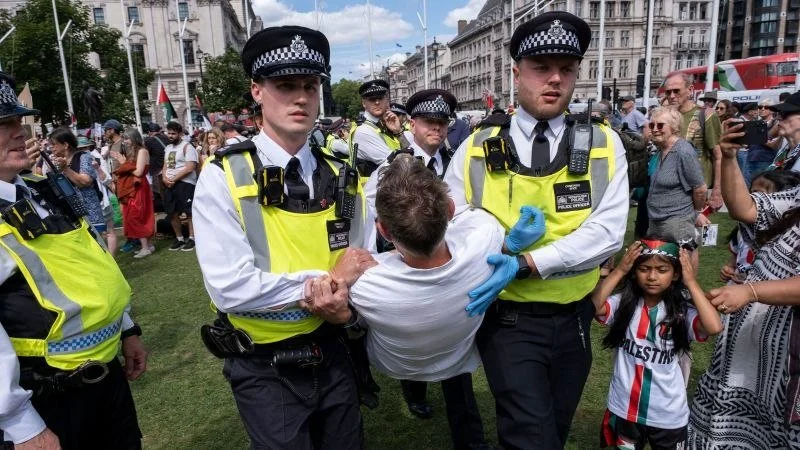Record Mass Arrests in London Over Support for Banned Group Palestine Action
Executive Summary
On August 9, 2025, London’s Metropolitan Police arrested 522 people—believed to be the highest number ever detained at a single protest in the UK capital—for displaying placards or otherwise showing support for Palestine Action, a group recently proscribed as a terrorist organization under the UK Terrorism Act 2000. The arrests, which included a large proportion of elderly participants, highlight the scale of domestic backlash against the ban and have intensified debate over the boundaries of national security law and free expression.
Key Judgments
Key Judgment 1
The arrests mark the largest single-day protest-related detention in modern London history, underscoring both the breadth of dissent against the Palestine Action ban and the police’s readiness to enforce counterterrorism statutes against non-violent acts of support.
Evidence: Police confirmed 522 arrests, nearly all for displaying placards in Parliament Square; the arrestees’ average age was 54, with nearly 100 aged in their 70s and 15 in their 80s.
Key Judgment 2
The ban on Palestine Action—and the arrests of its supporters—has provoked significant domestic and international criticism, which could fuel further acts of civil disobedience and amplify public scrutiny of UK counterterrorism policy.
Evidence: The UN, Amnesty International, Greenpeace UK, and other groups have condemned the proscription as legal overreach and a threat to free speech, while protest organizers framed the law as “widely ridiculed” and “impossible to practically implement.”
Key Judgment 3
By criminalizing symbolic expressions of solidarity, the UK government risks turning Palestine Action into a cause célèbre for broader anti-war and pro-Palestinian movements, potentially increasing recruitment and activism despite—or because of—the ban.
Evidence: Palestine Action’s direct action tactics have already forced multiple defense contractors to suspend operations; the ban has prompted nationwide protests and legal challenges, with some activists openly defying the law to invite arrest.
Analysis
The August 9 mass arrests were the culmination of weeks of escalating confrontation between UK authorities and supporters of Palestine Action. The group’s proscription on July 5 followed years of direct action targeting defense contractors linked to Israel’s military operations, most notably a June 2025 break-in at RAF Brize Norton causing £7 million in damage to two military aircraft. The Home Office justified the ban on grounds of “serious attacks” causing violence, injury, and significant property destruction, placing the group in the same legal category as ISIS and al-Qaeda.
Saturday’s demonstration in Parliament Square was openly designed to test the law’s enforceability, with hundreds holding signs stating “I oppose genocide. I support Palestine Action.” The resulting arrests—executed under the Terrorism Act 2000—represent one of the most visible applications of UK counterterrorism powers against a domestic protest movement. The age profile of those arrested, with a substantial number of pensioners, complicates official narratives portraying the movement as a youth-driven radical threat.
Internationally, the crackdown has deepened criticism of the UK’s approach to dissent. The UN’s human rights chief warned that extending counterterrorism measures to non-violent activism undermines democratic norms, while groups like Greenpeace UK accused the government of “turning the Met into thought police.” Domestically, the arrests may have limited immediate deterrent effect—organizers claim only a fraction of participants were detained, and most received “street bail” and were released the same day.
The broader strategic risk for the UK government is that the ban and its enforcement may bolster Palestine Action’s profile and credibility among sympathetic constituencies. By framing their prosecution as evidence of state complicity in “genocide” and repression, the group’s supporters can position themselves within a larger transnational movement against militarism and occupation, potentially increasing both domestic mobilization and global solidarity.
Sources
Arab News – UK police arrested 522 who backed banned pro-Palestine group
CBS/AP – London police brace for another day of protests over Israel-Gaza conflict
Newsweek – 200 Arrested by Police in London Amid Pro-Palestinian Protests
JURIST – Over 400 activists arrested at Palestine Action protest in London


